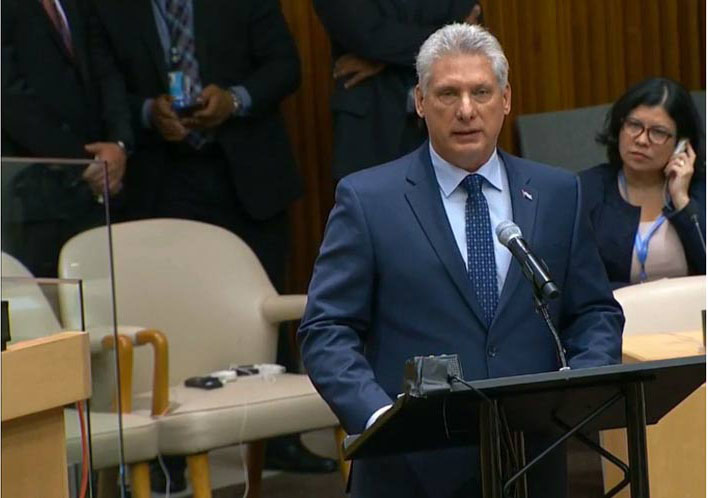
The President upheld it is an unavoidable duty for Cuba to celebrate the International Day for the Total Elimination of Nuclear Weapons every September 26
Cuba disallows security policies and military doctrines based on nuclear deterrence, President Miguel Diaz-Canel told the United Nations General Assembly that is holding its 73rd Period of sessions.
The Cuban Statesman stressed his country is committed to strengthening multilateralism and international treaties on disarmament with the goal of making the world free of nuclear weapons.
To show this will, Cuba was on January 31, 2018, the fifth country to ratify the treaty banning nuclear weapons, Diaz-Canel highlighted in his speech to the General Assembly that is celebrating this Thursday 26 the International Day for the Total Elimination of Nuclear Weapons.
This pact bans the use, existence and development of nuclear armaments, and underlines they are inhumane, immoral and ethically untenable, the Cuban President recalled.
Diaz-Canel highlighted Cuba will continue to insist the Treaty ought to be implemented and observed with efficient measures leading to the total elimination of such arsenals in an effective, transparent and irreversible manner.
The Statesman added the peaceful use of nuclear energy and technology has contributed to the socio-economic development of nations. Therefore, ‘We reaffirm the right to use peacefully nuclear energy without discrimination,’ Diaz-Canel pointed out, adding Cuba rejects the decision of the US Government to withdraw from the Joint Comprehensive Plan of Action, commonly known as the Iran nuclear deal.
The agreement was reached on July 14, 2015, between Iran and the P5+1 (the five permanent members of the UN Security Council plus Germany).
Failing to fulfill these international commitments goes against the international law and the good neighborly relations among nations, and will cause grave consequences for the stability and security in the Middle East, Diaz-Canel warned.
The President upheld it is an unavoidable duty for Cuba to celebrate the International Day for the Total Elimination of Nuclear Weapons every September 26.
He remarked such celebration means for his country a ‘just tribute to the memory of the historic leader of the Cuban Revolution, Fidel Castro, who was a tireless fighter for nuclear disarmament, an issue he addressed in many reflections and dedicated all his enery.’
Today, 73 years after the criminal atomic bombings of Hiroshima and Nagasaki, humanity continues under the threat of roughly 14,400 nuclear weapons, of which 3,750 are deployed and almost 2,000 are under operational alert, he said.
Diaz-Canel recalled Latin America and the Caribbean was the first densely populated region in the world to have declared itself Zone Free of Nuclear Weapons through the Tlatelolco Treaty of 1967.
Such will was ratified by the ‘Latin America and the Caribbean Proclaim as Zone of Peace’, which was signed by the Heads of States and Governments at the 2nd Summit of the Community of Latin America and Caribbean States, held in Havana in January, 2014, Diaz-Canel recalled.
 Escambray ENGLISH EDITION
Escambray ENGLISH EDITION





Escambray reserves the right to publish comments.